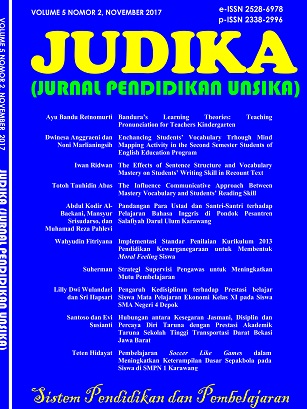ENHANCING STUDENTS’ VOCABULARY THROUGH MIND MAPPING ACTIVITY IN THE SECOND SEMESTER STUDENTS OF ENGLISH EDUCATION PROGRAM
DOI:
https://doi.org/10.35706/judika.v5i2.761Abstrak
This research aims to know (1) whether mind mapping activity can enhance students’ vocabulary (2) how is the classroom situation while mind mapping activity is implemented for the second semester students of English Education Program. The researcher uses classroom action research with two cycles and each cycle has four meetings. There are four steps in conducting this research; planning, acting, observing, and reflecting. In collecting data, there are two kinds of data used in this research, quantitative and qualitative data. The quantitative data is analysed by using descriptive statistics method in the form of students’ score of pre-test, post-test 1, and 2, and t-test of non-independent is used to see the significant difference of students’ improvement. While for the qualitative data they are collected from: observation, interview, and questioner by using triangulation method. The result of the research shows that there is improvement of students’ vocabulary in three vocabulary indicators: form, meaning, and word in use. The average scores in pre-test is 67.27, 72.47 for post-test 1, and 74.88 post-test 2. Furthermore, the improvement of classroom situation can be seen clearly from students’ participation, interest, high-performance, and high-engagement. Briefly, it is recommended for educators to use mind mapping activity to improve students’ vocabulary.
Key words: mind mapping activity, vocabulary, English learning







